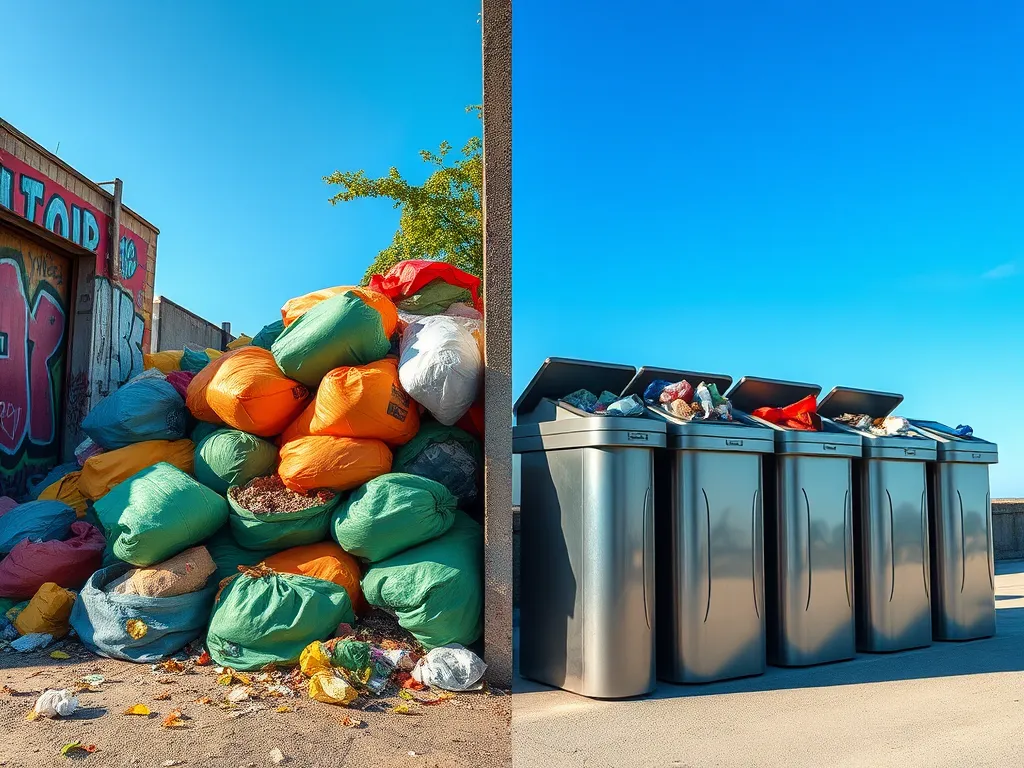Dumpster Bags vs. Bins: Which Waste Solution Wins?

Waste Disposal Solutions: A Complete Guide
Waste disposal solutions are essential for maintaining a clean environment and ensuring effective waste management. These solutions vary widely, from simple backyard composting to more complex commercial waste processing systems. With the increasing amount of waste generated daily, understanding different waste disposal solutions is crucial for individuals, businesses, and municipalities alike. This article delves into several waste disposal options and provides insights into their cost, convenience, environmental impact, usage scenarios, and maintenance needs.
One common method of waste disposal is the use of dumpster bags and bins. Dumpster bags offer a flexible solution for homeowners and contractors, allowing for a versatile disposal option that can easily accommodate various amounts of waste. In contrast, dumpster bins are often used by businesses for their larger waste management needs. Both options come with their benefits and limitations, making it important to assess individual needs before making a decision about waste disposal solutions.
When considering waste disposal solutions, one must also regard the regulatory framework surrounding waste management in different regions. Local laws often dictate how waste should be sorted, processed, and disposed of. It's vital to be informed about these regulations to avoid penalties and ensure a sustainable approach to waste disposal. Additionally, exploring innovative waste management technologies and practices can help minimize our environmental footprint and promote responsible waste management.
The importance of education and awareness in waste disposal solutions cannot be overstated. By educating communities, individuals can make informed choices about their waste disposal options. Sustainable practices and recycling initiatives can significantly reduce the amount of waste sent to landfills. Moreover, increasing awareness of the environmental impacts of improper waste management can motivate individuals to adopt better waste disposal habits and support local sustainability initiatives.
In summary, waste disposal solutions encompass a broad spectrum of methods and practices designed to manage waste efficiently and responsibly. As society continues to evolve, so too must our approach to waste disposal. Embracing a combination of effective practices, informed decision-making, and community education is essential for a healthier planet and a cleaner environment.
Cost Comparison of Waste Disposal Solutions
When comparing waste disposal options such as dumpster bags and bins, it's important to consider price analysis. Dumpster bags typically have a lower upfront cost compared to rental dumpsters. They can be bought or rented for specific durations, making them a budget-friendly option for small to medium projects. On the other hand, bins usually require a rental fee that can accumulate over time, especially if the waste generates over a longer duration.
Many consumers are now prioritizing sustainability, leading to increased interest in eco-friendly options such as https://news.climate.columbia.edu/2019/04/22/asked-eco-friendly-garbage-bags/ for waste disposal.
Hidden costs can arise with both waste disposal methods. For dumpster bags, additional fees may be charged for exceeding weight limits or for keeping the bag for an extended period. For dumpster bins, users should account for potential delivery and pickup fees, as well as charges for exceeding the bin's capacity. Understanding these hidden costs can help consumers make more informed choices.
When breaking down the cost-per-load, dumpster bags can be more economical for minor waste disposal needs, while larger projects might benefit from dumpster bins due to the fixed cost of disposal regardless of weight. Calculating cost per load encourages consumers to weigh their disposal needs against the pricing structures of available solutions.
Long-term savings analysis shows that while dumpster bags may appear cheaper initially, frequent users of waste disposal services may find bins to be a more cost-effective option in the long run. Assessing waste generation patterns can guide businesses and individuals to choose the option that best suits their financial situation.
Factors influencing disposal costs include local prices for disposal services, variations in waste types, and the frequency of pickups required. Additionally, consumers should factor in proximity to landfill sites, as this can impact transportation costs and overall pricing for waste disposal services.
Convenience and Accessibility of Waste Disposal Solutions
Ease of setup plays a crucial role in the choice of waste disposal methods. Dumpster bags require minimal setup—simply fill and schedule a pickup, making them incredibly user-friendly for homeowners tackling projects like decluttering, renovations, or cleanouts. In contrast, bins often require more logistics management to ensure an appropriate placement and timely pickups.
Transportation options differ between dumpsters and bins. Dumpster bags are delivered to your location and can often be picked up without additional transportation required. In comparison, bins may require both drop-off and pickup services, necessitating coordination with the waste disposal company.
Space requirements also differ between the two solutions. Dumpster bags are lightweight and can be stored flat, making them a good option for those with limited space. Bins, however, take up more room and are less flexible if space is at a premium.
Flexibility in pickup scheduling is another consideration. Dumpster bags can be customized according to the user's needs, allowing for flexible pickup arrangements. Bins, however, often have a fixed schedule and may require advance notice for pickup changes.
User preferences also factor into convenience. Homeowners may prefer the hassle-free approach of dumpster bags, while businesses might opt for bins due to their larger capacity and structured waste management approach.
Environmental Impact of Waste Disposal Solutions
Recyclability of materials is an important consideration when comparing dumpster bags and bins. Many dumpster bags are designed to be lightweight and may not support recyclables effectively, while bins often have designated areas for separating recyclable materials, encouraging better practices.
Waste management practices significantly influence the environmental footprint associated with each disposal method. For instance, proper sorting and recycling practices with bins can divert significant waste from landfills, contributing to a more sustainable waste management cycle.
Carbon footprint analysis reveals differences between disposal methods. Transportation emissions are a concern with both options; however, dumpster bags typically require fewer trips, potentially reducing overall emissions associated with waste disposal.
Sustainability considerations sway preferences toward waste disposal solutions that promote recycling and composting. Choosing bins can often lead to higher recycling rates due to their design and organizational features, which encourage responsible waste segregation.
Impact on landfill usage is a critical aspect of waste disposal solutions. Responsible use of dumpster bags and bins can lead to reduced landfill contributions, but this requires a commitment from users to recycle and dispose of waste correctly to reach desired outcomes.
Usage Scenarios for Waste Disposal Solutions
Best scenarios for using dumpster bags include small projects, home renovations, or cleanouts where only limited waste is generated. Their lightweight design and simple pickup make them ideal for ad-hoc waste disposal needs.
Ideal situations for choosing bins include ongoing construction projects, commercial use, or larger events where a substantial amount of waste is expected. Their larger capacity ensures users can manage waste effectively over longer durations.
Residential vs commercial use comparisons highlight that residential users often benefit more from dumpster bags due to their accessibility and ease of use, while commercial users find bins more advantageous for continuous waste generation.
Seasonal project considerations such as spring cleaning or landscaping projects may find dumpster bags to be a perfect temporary solution, while bins work well during busy periods when waste levels significantly increase.
Local regulations affecting choice play a vital role in determining whether to use dumpster bags or bins. Understanding regional waste guidelines can help users choose the most compliant and environmentally responsible disposal option.
Maintenance and Care for Waste Disposal Solutions
Cleaning and maintenance tips for dumpster bags include avoiding puncturing and keeping them clean to prevent odors and pests. Regularly inspecting the bag for wear can help extend its usability.
Durability and lifespan of bins depend on their material and design. Investing in high-quality bins can ensure they withstand harsh elements, prolonging their lifespan and effectiveness.
Dealing with odor and pests requires diligence in managing waste. Regularly emptying bins and ensuring they are tightly sealed can mitigate these issues while proper waste separation can further reduce odors and pest attraction.
Storage recommendations for empty options suggest keeping dumpster bags in a dry, shaded area to prevent damage, while bins should be stored in protected locations to avoid wear and tear.
Preparation for weather conditions includes ensuring dumpster bags are secured during storms and checking that bins are stable in high winds. Taking these precautions can help maintain the integrity of your waste disposal options.
